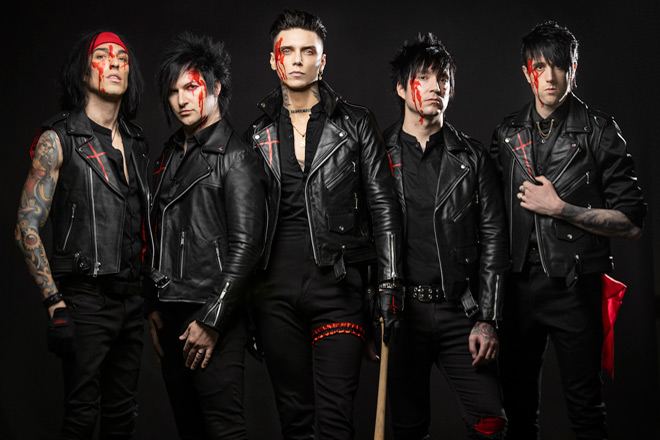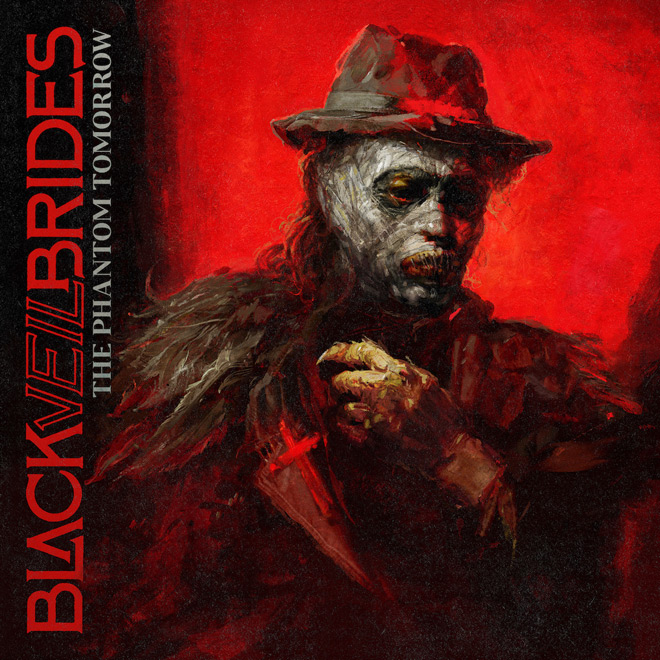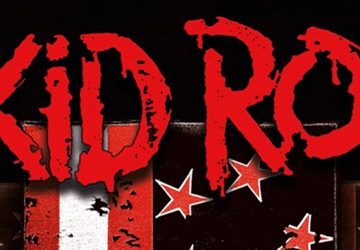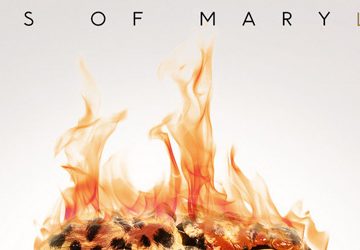
First established in Cincinnati, Ohio in 2006, Black Veil Brides has seen some changes in its lineup over the years, but in its current configuration consists of Andy Biersack (vocals), Jeremy “Jinxx” Ferguson (rhythm guitar, violin, backing vocals), Jake Pitts (lead guitar), Christian “CC” Coma (drums) and Lonny Eagleton (bass, backing vocals). The Phantom Tomorrow is the result of the creative brainchild of Vocalist Andy Biersack and his desire to turn this spark into a full-on rock opera concept album about a near-dystopian society which takes its influence from previous works like the movies Watchmen (2009), V for Vendetta (2005).
“Scarlet Cross” begins with Biersack’s voice bringing its signature depth and intimacy before delving into the anthemic ambiance of the chorus. In classic BVB style, the electricity and duality of the guitar sound on this track is reminiscent of ’80s Hair Metal. This quality gives the song a sense of familiarity as well introduces different dynamics throughout the track. “Born Again” sees Biersack tapping into his crooner vocal tone at the outset which grows more passionate heading into the chorus. There are really prominent and leading bass and percussion here courtesy of Coma and Eagleton.
“Blackbird” is a song of reclamation calling for the demi-hero of The Phantom Tomorrow to reclaim the essence of their being and hold fast to their truth and spirit despite the influence of this semi-dystopian world. The use of the blackbird symbolically here is significant because the blackbird is often used to symbolize the great mysteries or existence and seen as harbingers of truth. So, for them to be the symbol of choice here seems to be Biersack and company’s way of equating our most authentic, unencumbered selves with being gateways for understanding the great mysteries of life and unveiling our greatest truths. After spending some time in the instrumental haze of “Spectres (Interlude)” with its poignant violin that carries over “Blackbird’s” melody courtesy of Ferguson, we are delivered into “Torch.” Here the band delivers a tune akin to a power ballad with presence. It’s melodic and engaging without compromising the depth of the message. Additionally, the sharpness of the Coma’s kick drum adds a nice contrast to the overwhelming smoothness of the song.
“Shadows Rise” begins with a beautiful composition of violin and guitar that gently leads the way into the song giving tinker toy vibes before erupting into dirtier guitar sounds and gritter chords. This song explores darker themes of a conflicted soul fighting against the burgeoning darkness that threatens to overwhelm the spirit in its pursuit of light beyond the dark. There is a very distinct atmosphere to this track that feels sweeping and yet also heavy and inescapable. The storytelling here through the composition and lyrics works well for the narrative theme. “Fields of Bone” begins with an eerie quiet tone and rolls into the bouncing and charging chorus. The imagery and biblical allusion to afterlife and the internal conflict around the pursuit of heaven versus the reality of achieving it make this song even more intriguing.
Bringing things to a close are “Kill The Hero” and “Fall Eternal.” On “Kill The Hero” listeners are drawn into the chugging guitars and punchy drums that give this track a little more fullness. There is something incredibly visual about this anthemic call to arms that brings to mind images of the fall of a hero and the start of an uprising. Following that “Fall Eternal” very much feels like the lament of the fallen hero as they realize they may not have succeeded in the way they’d hoped, but rather have possibly become the villain of their own story. It’s rich and complex from a lyrical and narrative standpoint while avoiding overly complicated orchestral composition. Instrumentally, this track delivers the kind of upswept somberness and atmospheric gravity befitting the story being told here. It’s beautiful yet haunting and a fascinating end to this journey.
On this second half of the album, what Black Veil Brides succeed at here is execution and commitment to narrative. While some concept albums begin with a story and end up a mess, Biersack’s vision of the world of “The Phantom Tomorrow” as a movement is felt in the way the layers of this album expand on one another. Each track is a new tale, a new adventure, a different exploration of heroes and villains, salvation and damnation, evolution and revolution in a comic-noir dystopian atmosphere that is unlike the work of many of their contemporaries.
While Black Veil Brides have made a point to evolve their personal style and sound over the years, there remains the bones of their humble origins in ’80s Hair Metal influence. Although there is nothing preternatural about the core of this album and mostly consists of some boilerplate chord composition, there is something to be said about the thought they put into the arrangement and composition of each song. The Phantom Tomorrow gets points for conception and narrative storytelling, because it takes a certain amount of nerve to endeavor to create not only your own world but your own Rock Opera. So, for mood-setting, creative conception, and ambition Cryptic Rock gives Black Veil Brides The Phantom Tomorrow 4 out of 5 stars.






No comment